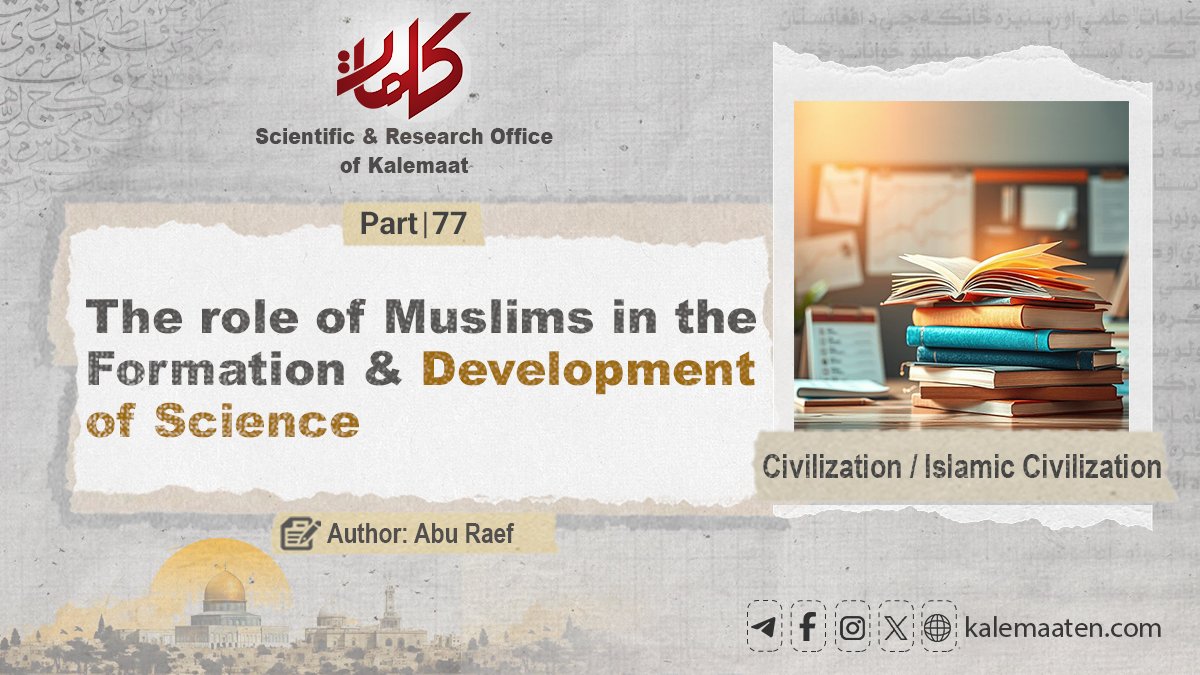Author: Abu Raef
The Role of Muslims in the Formation and Development of Sciences (Part 77)
The Crusades
Another important factor that facilitated the transmission of Islamic culture and civilization to European countries was the Crusades. Although these wars were waged to attack and invade Islamic lands, the advanced level of civilization and culture among Muslims caused the invaders themselves to be influenced by Islamic civilization and culture, prompting them to investigate and study it.
These wars lasted for nearly two centuries, beginning at the end of the 5th century AH/11th century CE, that is, in the year 490 AH/1097 CE, and ending with the fall of the last Crusader stronghold to the Mamluks in the year 690 AH/1291 CE. This period counts among the most important points of contact, influence, transfer, and adoption; for although the Crusaders came to the Islamic East for war and not for knowledge, they were affected by the Muslims’ civilization and carried whatever they could of their achievements back to Europe—at a time when Europe was mired in backwardness and decline.[1]
Gustave Le Bon states: “The contact between the West and the East over two centuries was one of the strongest factors in the growth of civilization in Europe. And if one wishes to imagine the effect of the East on the West, he should consider the state of the civilizations of the two nations facing each other: the East was at the height of flourishing, while the West was sunk in a sea of barbarism.”[2]
In this regard, Al-Maqrizi narrates that when Emperor Frederick II in the year 626 AH/1228 CE was traveling from Jerusalem to Acre to return to his country, he sent to Al-Kamil al-Ayyubi some problems in geometry and mathematics that had perplexed him. Al-Kamil, who loved knowledge, brought scholars close to himself, tested them, and rewarded them generously, presented those questions to one of the scholars of his state, namely Shaykh ‘Ilm al-Din Qaysar—a mathematician and engineer. He then sent Qaysar’s answers back to Frederick. Among the emperor’s questions were:
-
Why do spears, when partly immersed in water, appear bent and unstable?
-
Why do people with weak eyesight see threads before their eyes that appear like flies or gnats?[3]
The Europeans who came in successive waves to Islamic lands immersed themselves in bloodshed, killing innocents without mercy or compassion. But when they encountered the Muslim armies, they saw tempered swords, disciplined hearts, and merciful souls whose mission was not slavery, tyranny, or oppression. The Crusaders witnessed equality, justice, and brotherhood; thus, they revolted against the feudal system and the demeaning of humanity in their own society. They objected to the domination and tyranny of the Church, and they opposed the accumulation of wealth in the hands of a few princes and royal brokers.
They acknowledged the science, art, and civilization they had seen among Muslims; and many industries, plants, medicines, dyes, architectural and engineering arts, the construction of fortresses and castles, as well as numerous Islamic traditions in clothing, food, and family life were transmitted to Europe. The Crusaders returned, suddenly aware of their own weakness, the ignorance of their thought, and the wretchedness of their society; hence, they set out in pursuit of knowledge and wisdom, seeking social reform and intellectual, industrial, and moral advancement.[4]
Gustave Le Bon says: “The effect of the East, through the Crusades, in civilizing the West was immense, and that effect was more evident in the arts, industries, and commerce than in the sciences and literature. And if we look at the continuous expansion of commercial relations between East and West, and at the growth of the arts and industries that arose from the mingling of the Crusaders and the Orientals, we realize that it was the Orientals who delivered the West from savagery and prepared hearts for progress; and all this was thanks to the sciences and culture of the Arabs, upon which the universities of Europe depended, and from which the ‘Renaissance’ eventually emerged.”[5]
Continues…
Previous Part/ Next Part
References:
[1] Mādhā qaddama al-Muslimūn lil-‘Ālam?, p. 702.
[2] Ḥaḍārat al-‘Arab, p. 334.
[3] Al-Rubay‘ī, ‘Abdullah ibn ‘Abd al-Raḥmān, Athar al-Sharq al-Islāmī fī al-Fikr al-Ūrūbbī khilāl al-Ḥurūb al-Ṣalībiyyah, pp. 98–99, Riyadh, Saudi Arabia.
[4] Mādhā qaddama al-Muslimūn lil-‘Ālam?, p. 703.
[5] Ḥaḍārat al-‘Arab, p. 339.



